University Nursing Student: Final Career Planning Portfolio
VerifiedAdded on 2022/11/10
|12
|3583
|130
Portfolio
AI Summary
This portfolio presents a final-year nursing student's career plan, encompassing reflections on personal and professional achievements during practice placements and studies, linked to the Practice Assessment Document (PAD). The student analyzes future development needs in relation to Continuing Professional Development (CPD) and revalidation, considering their final placement and future professional practice. The portfolio also critically evaluates the student's role in statutory registration and accountable practice, highlighting the importance of continuous learning and professional development to meet the standards of the Nursing and Midwifery Council (NMC). It emphasizes the development of essential skills such as communication, teamwork, leadership, and time management, crucial for effective nursing practice and patient care. The portfolio demonstrates the student's commitment to upholding standards of care and ethical practice, providing a comprehensive overview of their journey towards becoming a registered nurse.
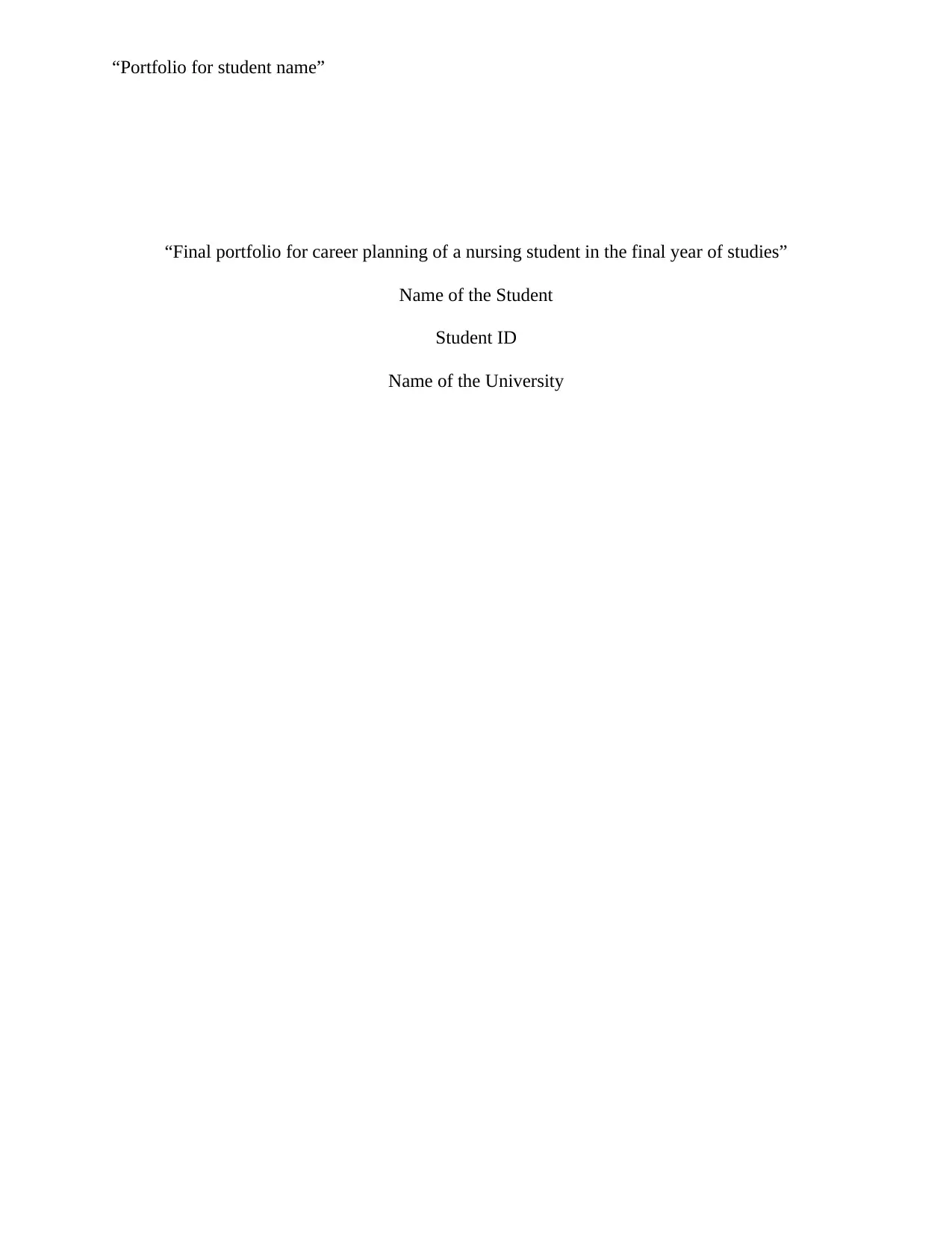
“Portfolio for student name”
“Final portfolio for career planning of a nursing student in the final year of studies”
Name of the Student
Student ID
Name of the University
“Final portfolio for career planning of a nursing student in the final year of studies”
Name of the Student
Student ID
Name of the University
Paraphrase This Document
Need a fresh take? Get an instant paraphrase of this document with our AI Paraphraser
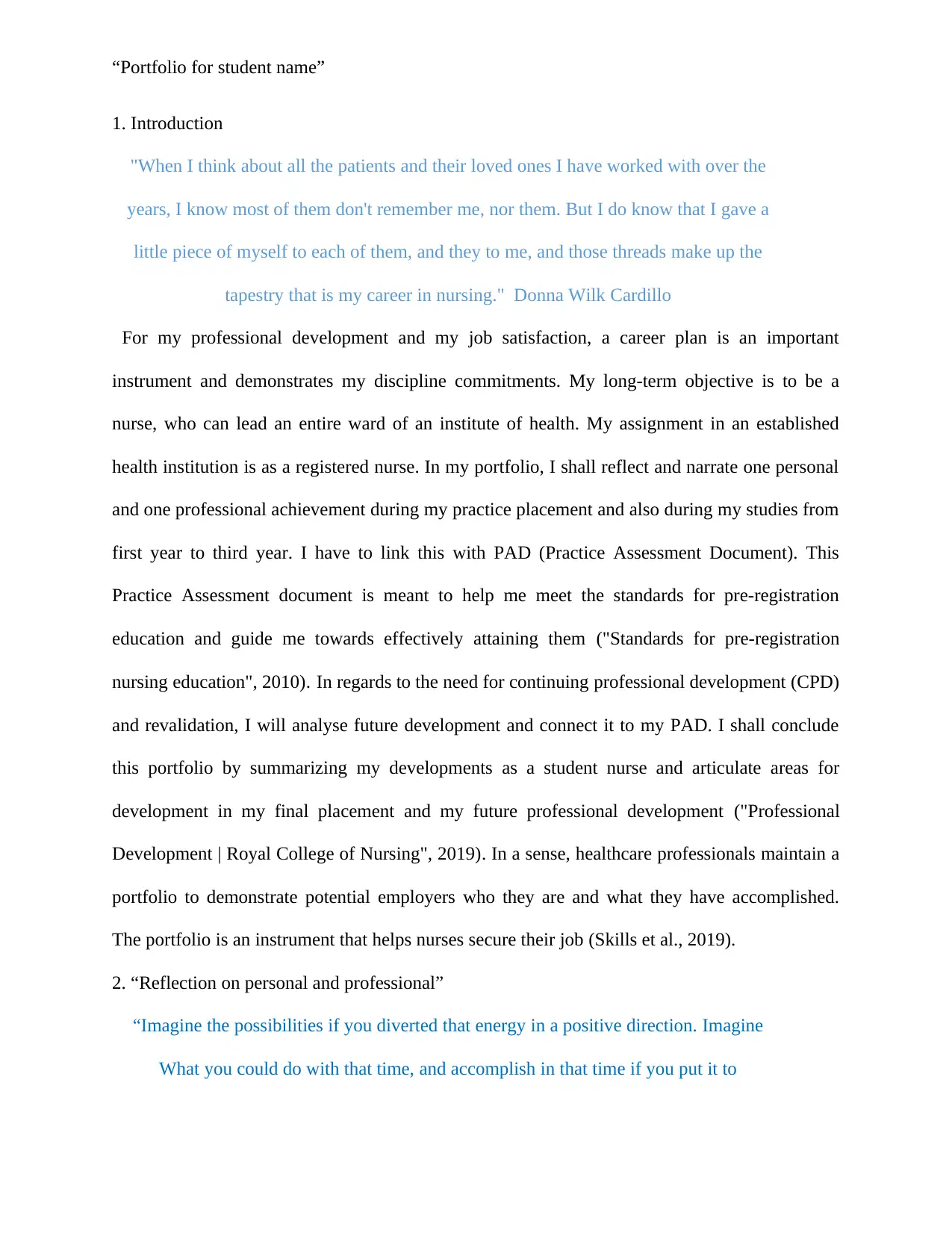
“Portfolio for student name”
1. Introduction
"When I think about all the patients and their loved ones I have worked with over the
years, I know most of them don't remember me, nor them. But I do know that I gave a
little piece of myself to each of them, and they to me, and those threads make up the
tapestry that is my career in nursing." Donna Wilk Cardillo
For my professional development and my job satisfaction, a career plan is an important
instrument and demonstrates my discipline commitments. My long-term objective is to be a
nurse, who can lead an entire ward of an institute of health. My assignment in an established
health institution is as a registered nurse. In my portfolio, I shall reflect and narrate one personal
and one professional achievement during my practice placement and also during my studies from
first year to third year. I have to link this with PAD (Practice Assessment Document). This
Practice Assessment document is meant to help me meet the standards for pre-registration
education and guide me towards effectively attaining them ("Standards for pre-registration
nursing education", 2010). In regards to the need for continuing professional development (CPD)
and revalidation, I will analyse future development and connect it to my PAD. I shall conclude
this portfolio by summarizing my developments as a student nurse and articulate areas for
development in my final placement and my future professional development ("Professional
Development | Royal College of Nursing", 2019). In a sense, healthcare professionals maintain a
portfolio to demonstrate potential employers who they are and what they have accomplished.
The portfolio is an instrument that helps nurses secure their job (Skills et al., 2019).
2. “Reflection on personal and professional”
“Imagine the possibilities if you diverted that energy in a positive direction. Imagine
What you could do with that time, and accomplish in that time if you put it to
1. Introduction
"When I think about all the patients and their loved ones I have worked with over the
years, I know most of them don't remember me, nor them. But I do know that I gave a
little piece of myself to each of them, and they to me, and those threads make up the
tapestry that is my career in nursing." Donna Wilk Cardillo
For my professional development and my job satisfaction, a career plan is an important
instrument and demonstrates my discipline commitments. My long-term objective is to be a
nurse, who can lead an entire ward of an institute of health. My assignment in an established
health institution is as a registered nurse. In my portfolio, I shall reflect and narrate one personal
and one professional achievement during my practice placement and also during my studies from
first year to third year. I have to link this with PAD (Practice Assessment Document). This
Practice Assessment document is meant to help me meet the standards for pre-registration
education and guide me towards effectively attaining them ("Standards for pre-registration
nursing education", 2010). In regards to the need for continuing professional development (CPD)
and revalidation, I will analyse future development and connect it to my PAD. I shall conclude
this portfolio by summarizing my developments as a student nurse and articulate areas for
development in my final placement and my future professional development ("Professional
Development | Royal College of Nursing", 2019). In a sense, healthcare professionals maintain a
portfolio to demonstrate potential employers who they are and what they have accomplished.
The portfolio is an instrument that helps nurses secure their job (Skills et al., 2019).
2. “Reflection on personal and professional”
“Imagine the possibilities if you diverted that energy in a positive direction. Imagine
What you could do with that time, and accomplish in that time if you put it to
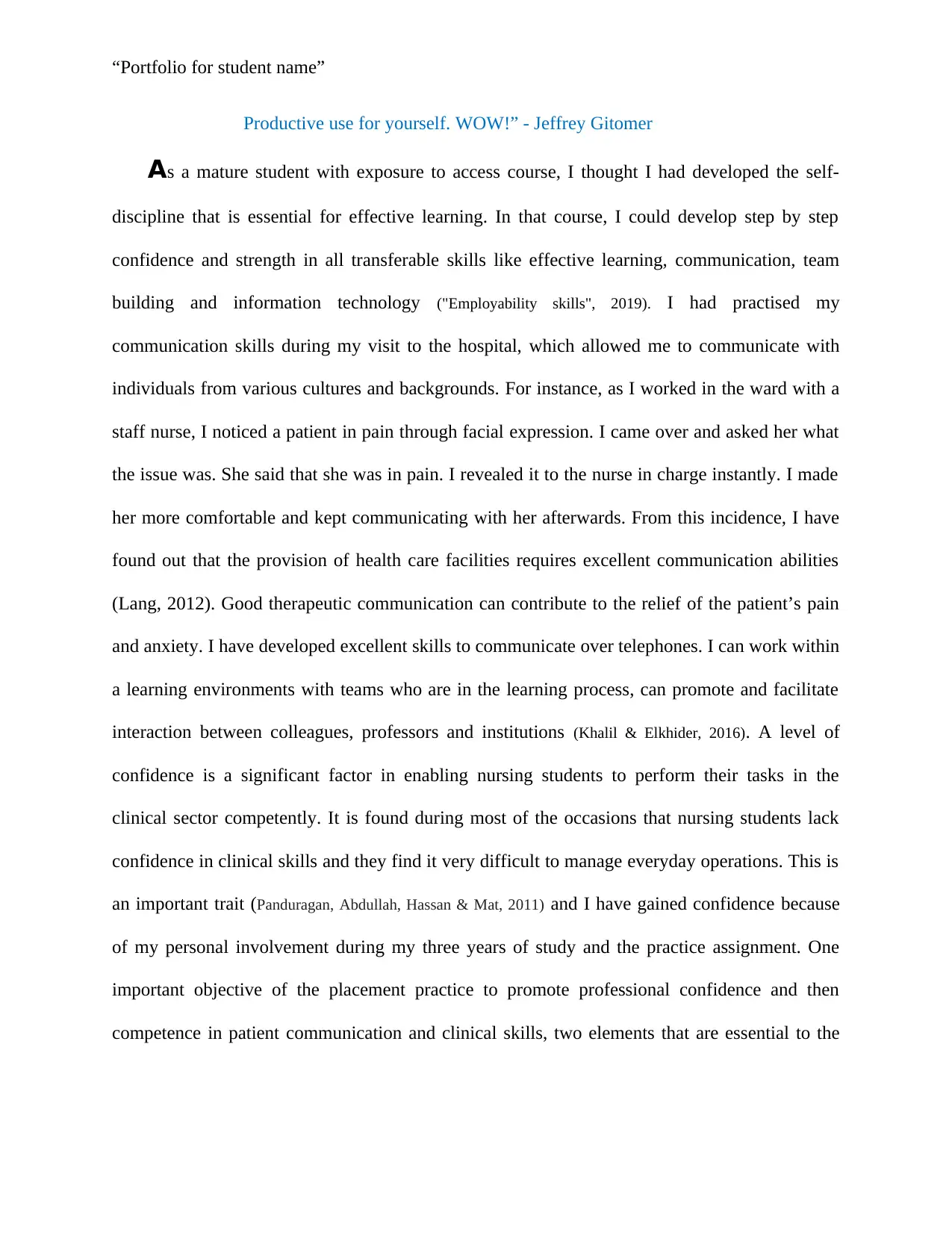
“Portfolio for student name”
Productive use for yourself. WOW!” - Jeffrey Gitomer
As a mature student with exposure to access course, I thought I had developed the self-
discipline that is essential for effective learning. In that course, I could develop step by step
confidence and strength in all transferable skills like effective learning, communication, team
building and information technology ("Employability skills", 2019). I had practised my
communication skills during my visit to the hospital, which allowed me to communicate with
individuals from various cultures and backgrounds. For instance, as I worked in the ward with a
staff nurse, I noticed a patient in pain through facial expression. I came over and asked her what
the issue was. She said that she was in pain. I revealed it to the nurse in charge instantly. I made
her more comfortable and kept communicating with her afterwards. From this incidence, I have
found out that the provision of health care facilities requires excellent communication abilities
(Lang, 2012). Good therapeutic communication can contribute to the relief of the patient’s pain
and anxiety. I have developed excellent skills to communicate over telephones. I can work within
a learning environments with teams who are in the learning process, can promote and facilitate
interaction between colleagues, professors and institutions (Khalil & Elkhider, 2016). A level of
confidence is a significant factor in enabling nursing students to perform their tasks in the
clinical sector competently. It is found during most of the occasions that nursing students lack
confidence in clinical skills and they find it very difficult to manage everyday operations. This is
an important trait (Panduragan, Abdullah, Hassan & Mat, 2011) and I have gained confidence because
of my personal involvement during my three years of study and the practice assignment. One
important objective of the placement practice to promote professional confidence and then
competence in patient communication and clinical skills, two elements that are essential to the
Productive use for yourself. WOW!” - Jeffrey Gitomer
As a mature student with exposure to access course, I thought I had developed the self-
discipline that is essential for effective learning. In that course, I could develop step by step
confidence and strength in all transferable skills like effective learning, communication, team
building and information technology ("Employability skills", 2019). I had practised my
communication skills during my visit to the hospital, which allowed me to communicate with
individuals from various cultures and backgrounds. For instance, as I worked in the ward with a
staff nurse, I noticed a patient in pain through facial expression. I came over and asked her what
the issue was. She said that she was in pain. I revealed it to the nurse in charge instantly. I made
her more comfortable and kept communicating with her afterwards. From this incidence, I have
found out that the provision of health care facilities requires excellent communication abilities
(Lang, 2012). Good therapeutic communication can contribute to the relief of the patient’s pain
and anxiety. I have developed excellent skills to communicate over telephones. I can work within
a learning environments with teams who are in the learning process, can promote and facilitate
interaction between colleagues, professors and institutions (Khalil & Elkhider, 2016). A level of
confidence is a significant factor in enabling nursing students to perform their tasks in the
clinical sector competently. It is found during most of the occasions that nursing students lack
confidence in clinical skills and they find it very difficult to manage everyday operations. This is
an important trait (Panduragan, Abdullah, Hassan & Mat, 2011) and I have gained confidence because
of my personal involvement during my three years of study and the practice assignment. One
important objective of the placement practice to promote professional confidence and then
competence in patient communication and clinical skills, two elements that are essential to the
⊘ This is a preview!⊘
Do you want full access?
Subscribe today to unlock all pages.

Trusted by 1+ million students worldwide
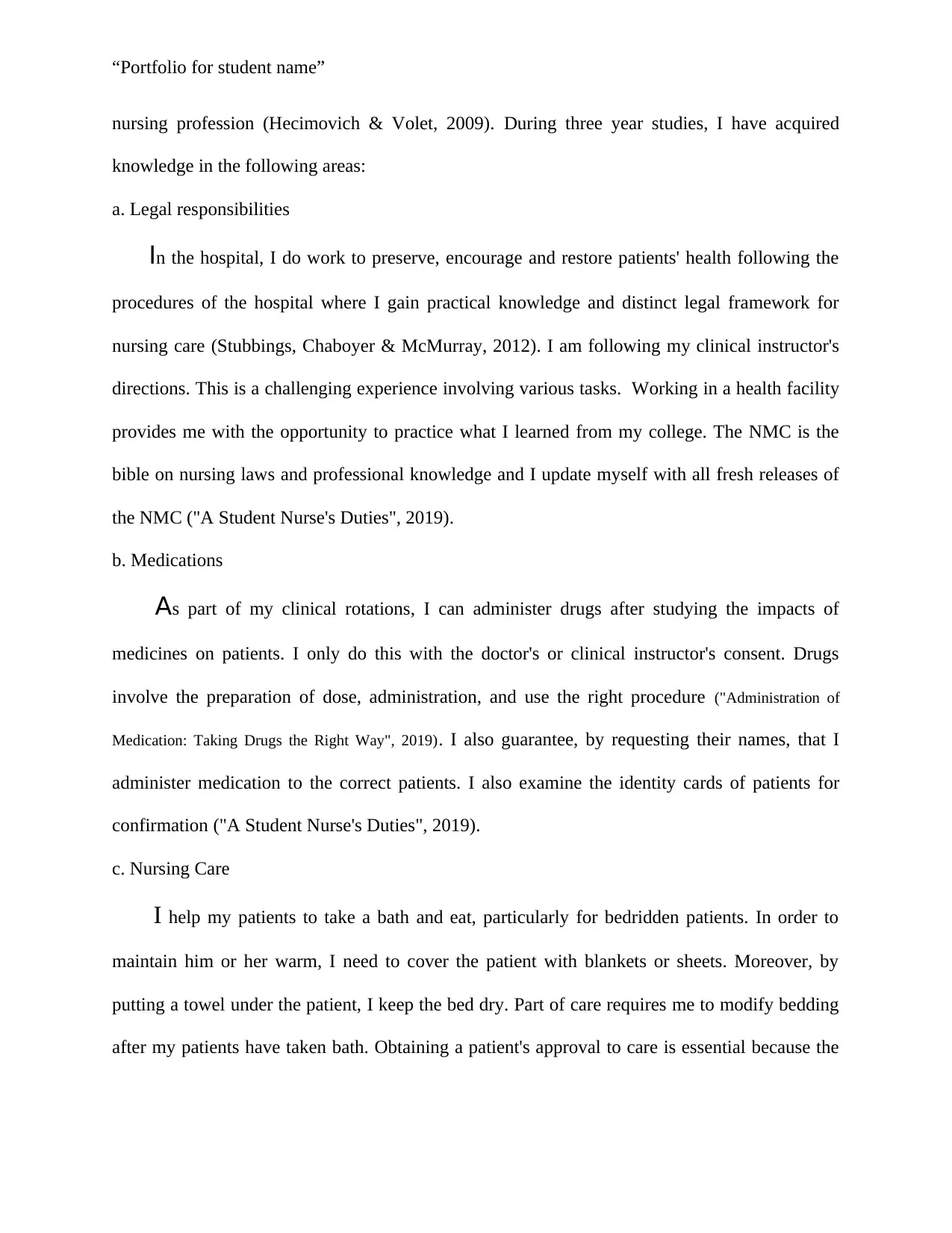
“Portfolio for student name”
nursing profession (Hecimovich & Volet, 2009). During three year studies, I have acquired
knowledge in the following areas:
a. Legal responsibilities
In the hospital, I do work to preserve, encourage and restore patients' health following the
procedures of the hospital where I gain practical knowledge and distinct legal framework for
nursing care (Stubbings, Chaboyer & McMurray, 2012). I am following my clinical instructor's
directions. This is a challenging experience involving various tasks. Working in a health facility
provides me with the opportunity to practice what I learned from my college. The NMC is the
bible on nursing laws and professional knowledge and I update myself with all fresh releases of
the NMC ("A Student Nurse's Duties", 2019).
b. Medications
As part of my clinical rotations, I can administer drugs after studying the impacts of
medicines on patients. I only do this with the doctor's or clinical instructor's consent. Drugs
involve the preparation of dose, administration, and use the right procedure ("Administration of
Medication: Taking Drugs the Right Way", 2019). I also guarantee, by requesting their names, that I
administer medication to the correct patients. I also examine the identity cards of patients for
confirmation ("A Student Nurse's Duties", 2019).
c. Nursing Care
I help my patients to take a bath and eat, particularly for bedridden patients. In order to
maintain him or her warm, I need to cover the patient with blankets or sheets. Moreover, by
putting a towel under the patient, I keep the bed dry. Part of care requires me to modify bedding
after my patients have taken bath. Obtaining a patient's approval to care is essential because the
nursing profession (Hecimovich & Volet, 2009). During three year studies, I have acquired
knowledge in the following areas:
a. Legal responsibilities
In the hospital, I do work to preserve, encourage and restore patients' health following the
procedures of the hospital where I gain practical knowledge and distinct legal framework for
nursing care (Stubbings, Chaboyer & McMurray, 2012). I am following my clinical instructor's
directions. This is a challenging experience involving various tasks. Working in a health facility
provides me with the opportunity to practice what I learned from my college. The NMC is the
bible on nursing laws and professional knowledge and I update myself with all fresh releases of
the NMC ("A Student Nurse's Duties", 2019).
b. Medications
As part of my clinical rotations, I can administer drugs after studying the impacts of
medicines on patients. I only do this with the doctor's or clinical instructor's consent. Drugs
involve the preparation of dose, administration, and use the right procedure ("Administration of
Medication: Taking Drugs the Right Way", 2019). I also guarantee, by requesting their names, that I
administer medication to the correct patients. I also examine the identity cards of patients for
confirmation ("A Student Nurse's Duties", 2019).
c. Nursing Care
I help my patients to take a bath and eat, particularly for bedridden patients. In order to
maintain him or her warm, I need to cover the patient with blankets or sheets. Moreover, by
putting a towel under the patient, I keep the bed dry. Part of care requires me to modify bedding
after my patients have taken bath. Obtaining a patient's approval to care is essential because the
Paraphrase This Document
Need a fresh take? Get an instant paraphrase of this document with our AI Paraphraser
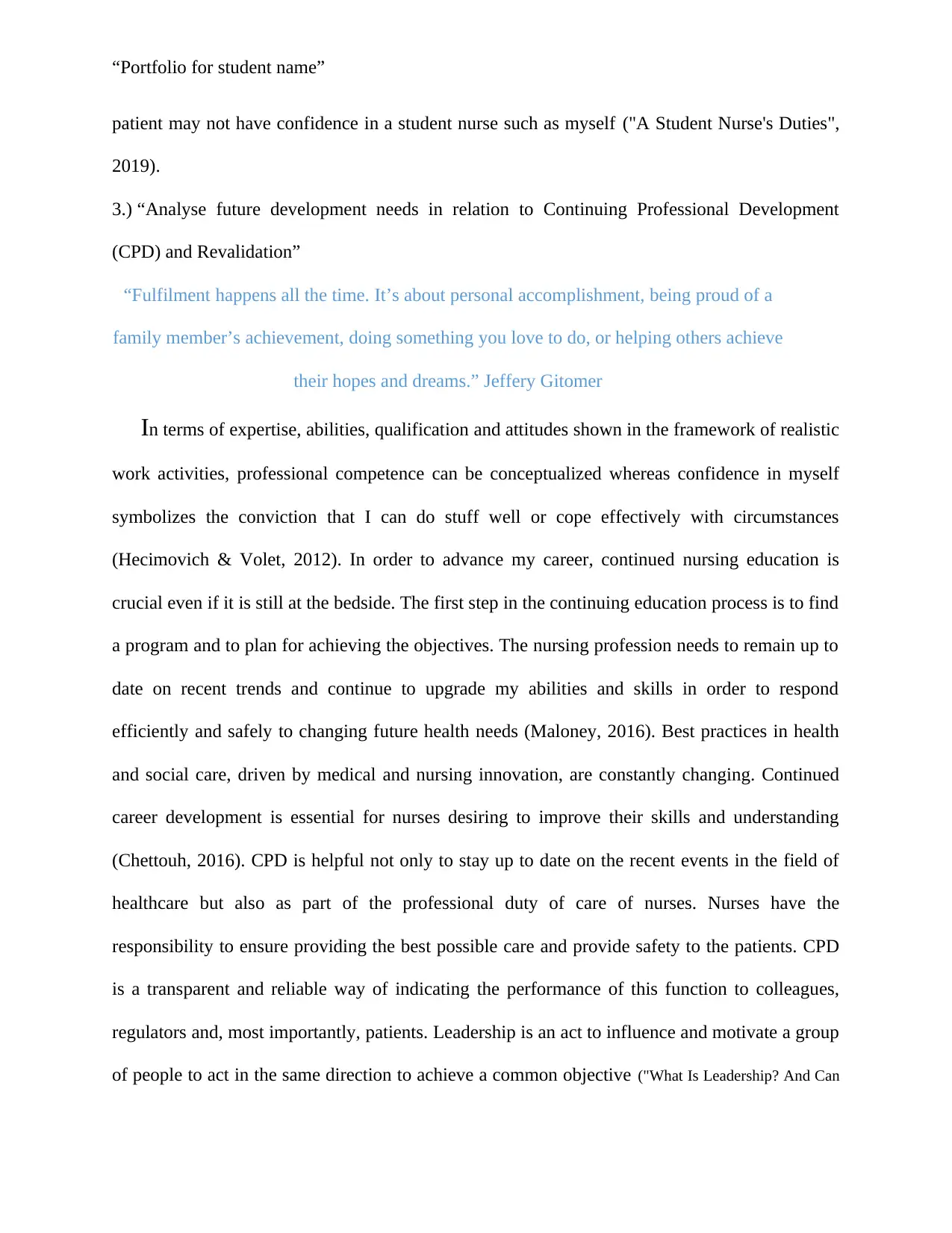
“Portfolio for student name”
patient may not have confidence in a student nurse such as myself ("A Student Nurse's Duties",
2019).
3.) “Analyse future development needs in relation to Continuing Professional Development
(CPD) and Revalidation”
“Fulfilment happens all the time. It’s about personal accomplishment, being proud of a
family member’s achievement, doing something you love to do, or helping others achieve
their hopes and dreams.” Jeffery Gitomer
In terms of expertise, abilities, qualification and attitudes shown in the framework of realistic
work activities, professional competence can be conceptualized whereas confidence in myself
symbolizes the conviction that I can do stuff well or cope effectively with circumstances
(Hecimovich & Volet, 2012). In order to advance my career, continued nursing education is
crucial even if it is still at the bedside. The first step in the continuing education process is to find
a program and to plan for achieving the objectives. The nursing profession needs to remain up to
date on recent trends and continue to upgrade my abilities and skills in order to respond
efficiently and safely to changing future health needs (Maloney, 2016). Best practices in health
and social care, driven by medical and nursing innovation, are constantly changing. Continued
career development is essential for nurses desiring to improve their skills and understanding
(Chettouh, 2016). CPD is helpful not only to stay up to date on the recent events in the field of
healthcare but also as part of the professional duty of care of nurses. Nurses have the
responsibility to ensure providing the best possible care and provide safety to the patients. CPD
is a transparent and reliable way of indicating the performance of this function to colleagues,
regulators and, most importantly, patients. Leadership is an act to influence and motivate a group
of people to act in the same direction to achieve a common objective ("What Is Leadership? And Can
patient may not have confidence in a student nurse such as myself ("A Student Nurse's Duties",
2019).
3.) “Analyse future development needs in relation to Continuing Professional Development
(CPD) and Revalidation”
“Fulfilment happens all the time. It’s about personal accomplishment, being proud of a
family member’s achievement, doing something you love to do, or helping others achieve
their hopes and dreams.” Jeffery Gitomer
In terms of expertise, abilities, qualification and attitudes shown in the framework of realistic
work activities, professional competence can be conceptualized whereas confidence in myself
symbolizes the conviction that I can do stuff well or cope effectively with circumstances
(Hecimovich & Volet, 2012). In order to advance my career, continued nursing education is
crucial even if it is still at the bedside. The first step in the continuing education process is to find
a program and to plan for achieving the objectives. The nursing profession needs to remain up to
date on recent trends and continue to upgrade my abilities and skills in order to respond
efficiently and safely to changing future health needs (Maloney, 2016). Best practices in health
and social care, driven by medical and nursing innovation, are constantly changing. Continued
career development is essential for nurses desiring to improve their skills and understanding
(Chettouh, 2016). CPD is helpful not only to stay up to date on the recent events in the field of
healthcare but also as part of the professional duty of care of nurses. Nurses have the
responsibility to ensure providing the best possible care and provide safety to the patients. CPD
is a transparent and reliable way of indicating the performance of this function to colleagues,
regulators and, most importantly, patients. Leadership is an act to influence and motivate a group
of people to act in the same direction to achieve a common objective ("What Is Leadership? And Can
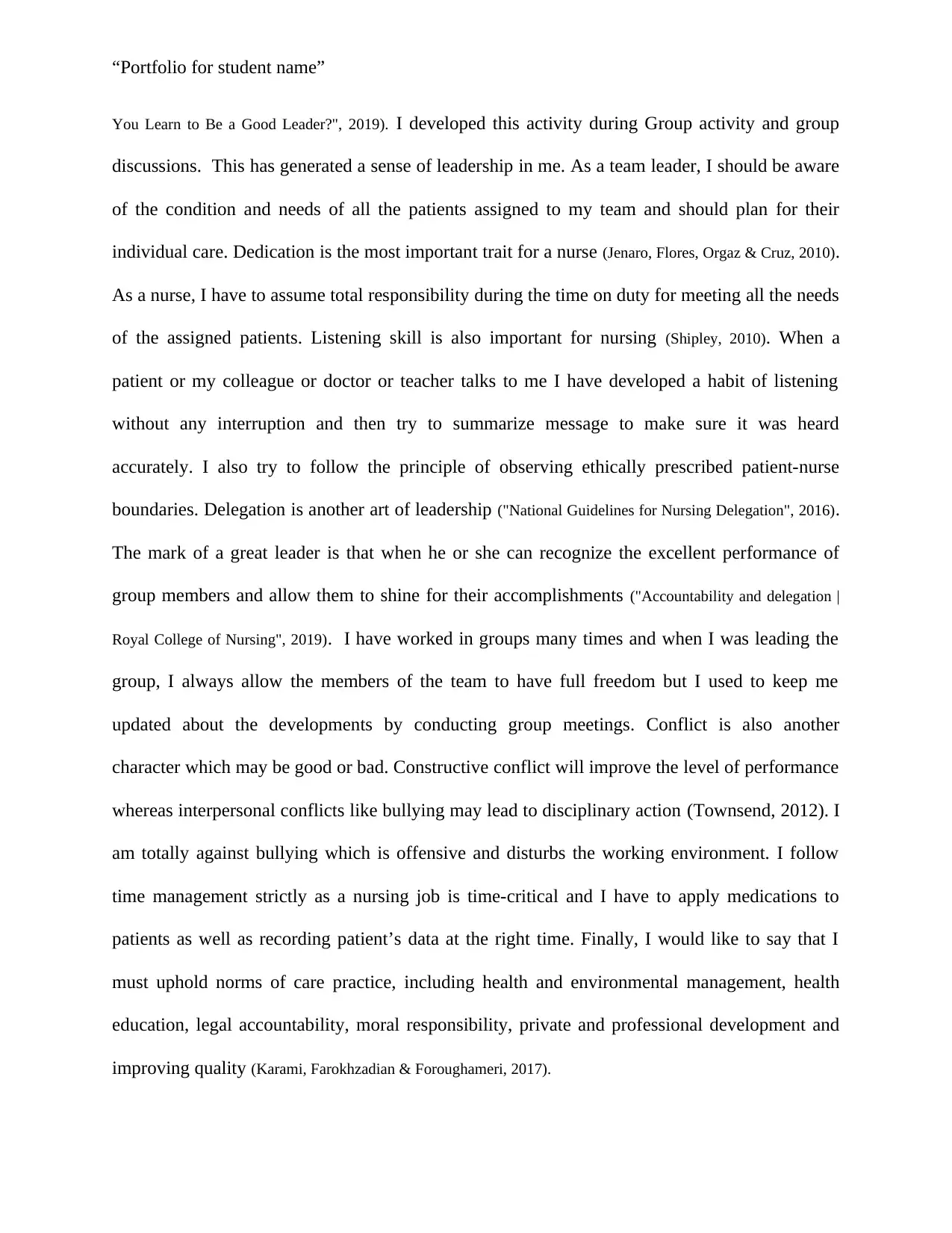
“Portfolio for student name”
You Learn to Be a Good Leader?", 2019). I developed this activity during Group activity and group
discussions. This has generated a sense of leadership in me. As a team leader, I should be aware
of the condition and needs of all the patients assigned to my team and should plan for their
individual care. Dedication is the most important trait for a nurse (Jenaro, Flores, Orgaz & Cruz, 2010).
As a nurse, I have to assume total responsibility during the time on duty for meeting all the needs
of the assigned patients. Listening skill is also important for nursing (Shipley, 2010). When a
patient or my colleague or doctor or teacher talks to me I have developed a habit of listening
without any interruption and then try to summarize message to make sure it was heard
accurately. I also try to follow the principle of observing ethically prescribed patient-nurse
boundaries. Delegation is another art of leadership ("National Guidelines for Nursing Delegation", 2016).
The mark of a great leader is that when he or she can recognize the excellent performance of
group members and allow them to shine for their accomplishments ("Accountability and delegation |
Royal College of Nursing", 2019). I have worked in groups many times and when I was leading the
group, I always allow the members of the team to have full freedom but I used to keep me
updated about the developments by conducting group meetings. Conflict is also another
character which may be good or bad. Constructive conflict will improve the level of performance
whereas interpersonal conflicts like bullying may lead to disciplinary action (Townsend, 2012). I
am totally against bullying which is offensive and disturbs the working environment. I follow
time management strictly as a nursing job is time-critical and I have to apply medications to
patients as well as recording patient’s data at the right time. Finally, I would like to say that I
must uphold norms of care practice, including health and environmental management, health
education, legal accountability, moral responsibility, private and professional development and
improving quality (Karami, Farokhzadian & Foroughameri, 2017).
You Learn to Be a Good Leader?", 2019). I developed this activity during Group activity and group
discussions. This has generated a sense of leadership in me. As a team leader, I should be aware
of the condition and needs of all the patients assigned to my team and should plan for their
individual care. Dedication is the most important trait for a nurse (Jenaro, Flores, Orgaz & Cruz, 2010).
As a nurse, I have to assume total responsibility during the time on duty for meeting all the needs
of the assigned patients. Listening skill is also important for nursing (Shipley, 2010). When a
patient or my colleague or doctor or teacher talks to me I have developed a habit of listening
without any interruption and then try to summarize message to make sure it was heard
accurately. I also try to follow the principle of observing ethically prescribed patient-nurse
boundaries. Delegation is another art of leadership ("National Guidelines for Nursing Delegation", 2016).
The mark of a great leader is that when he or she can recognize the excellent performance of
group members and allow them to shine for their accomplishments ("Accountability and delegation |
Royal College of Nursing", 2019). I have worked in groups many times and when I was leading the
group, I always allow the members of the team to have full freedom but I used to keep me
updated about the developments by conducting group meetings. Conflict is also another
character which may be good or bad. Constructive conflict will improve the level of performance
whereas interpersonal conflicts like bullying may lead to disciplinary action (Townsend, 2012). I
am totally against bullying which is offensive and disturbs the working environment. I follow
time management strictly as a nursing job is time-critical and I have to apply medications to
patients as well as recording patient’s data at the right time. Finally, I would like to say that I
must uphold norms of care practice, including health and environmental management, health
education, legal accountability, moral responsibility, private and professional development and
improving quality (Karami, Farokhzadian & Foroughameri, 2017).
⊘ This is a preview!⊘
Do you want full access?
Subscribe today to unlock all pages.

Trusted by 1+ million students worldwide
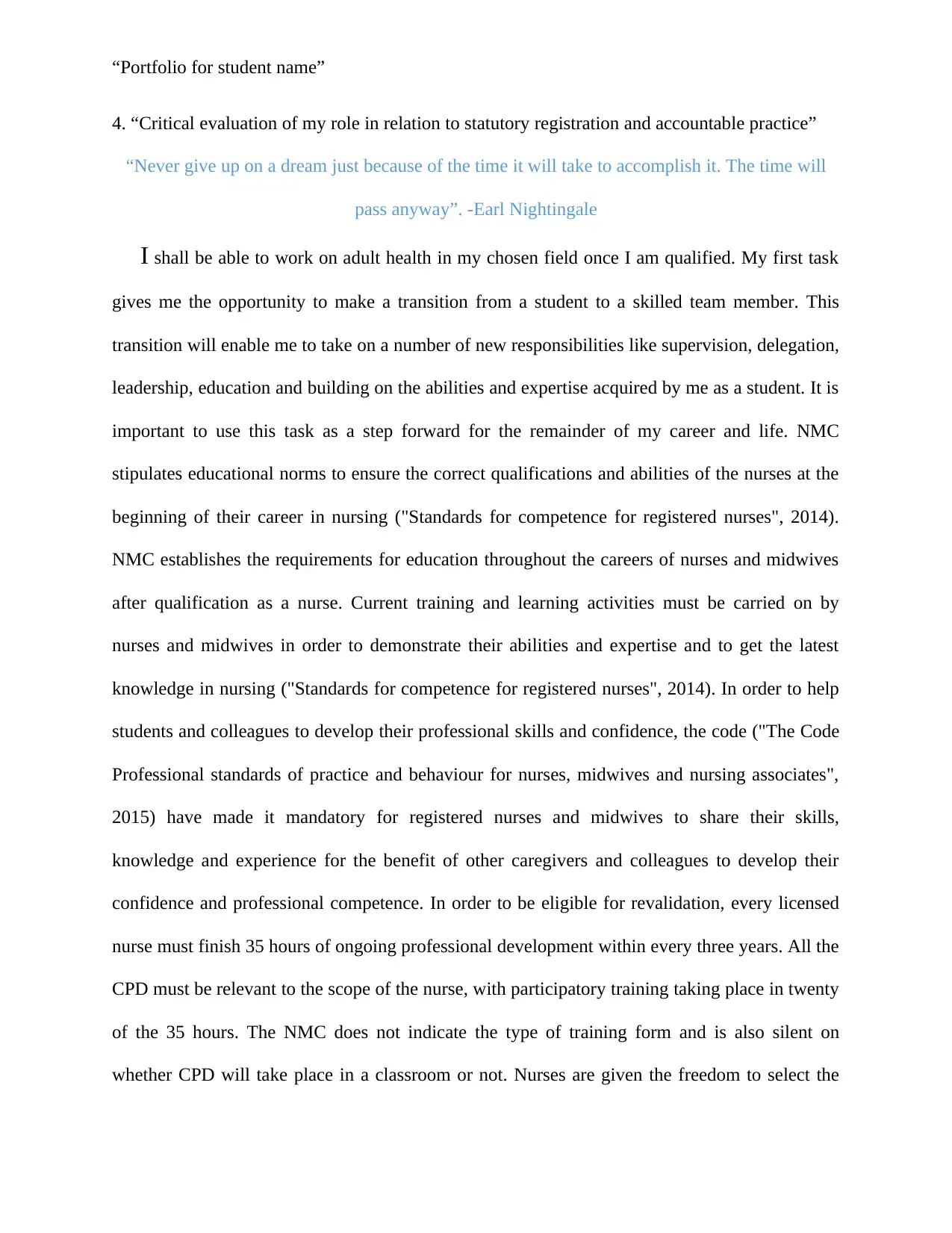
“Portfolio for student name”
4. “Critical evaluation of my role in relation to statutory registration and accountable practice”
“Never give up on a dream just because of the time it will take to accomplish it. The time will
pass anyway”. -Earl Nightingale
I shall be able to work on adult health in my chosen field once I am qualified. My first task
gives me the opportunity to make a transition from a student to a skilled team member. This
transition will enable me to take on a number of new responsibilities like supervision, delegation,
leadership, education and building on the abilities and expertise acquired by me as a student. It is
important to use this task as a step forward for the remainder of my career and life. NMC
stipulates educational norms to ensure the correct qualifications and abilities of the nurses at the
beginning of their career in nursing ("Standards for competence for registered nurses", 2014).
NMC establishes the requirements for education throughout the careers of nurses and midwives
after qualification as a nurse. Current training and learning activities must be carried on by
nurses and midwives in order to demonstrate their abilities and expertise and to get the latest
knowledge in nursing ("Standards for competence for registered nurses", 2014). In order to help
students and colleagues to develop their professional skills and confidence, the code ("The Code
Professional standards of practice and behaviour for nurses, midwives and nursing associates",
2015) have made it mandatory for registered nurses and midwives to share their skills,
knowledge and experience for the benefit of other caregivers and colleagues to develop their
confidence and professional competence. In order to be eligible for revalidation, every licensed
nurse must finish 35 hours of ongoing professional development within every three years. All the
CPD must be relevant to the scope of the nurse, with participatory training taking place in twenty
of the 35 hours. The NMC does not indicate the type of training form and is also silent on
whether CPD will take place in a classroom or not. Nurses are given the freedom to select the
4. “Critical evaluation of my role in relation to statutory registration and accountable practice”
“Never give up on a dream just because of the time it will take to accomplish it. The time will
pass anyway”. -Earl Nightingale
I shall be able to work on adult health in my chosen field once I am qualified. My first task
gives me the opportunity to make a transition from a student to a skilled team member. This
transition will enable me to take on a number of new responsibilities like supervision, delegation,
leadership, education and building on the abilities and expertise acquired by me as a student. It is
important to use this task as a step forward for the remainder of my career and life. NMC
stipulates educational norms to ensure the correct qualifications and abilities of the nurses at the
beginning of their career in nursing ("Standards for competence for registered nurses", 2014).
NMC establishes the requirements for education throughout the careers of nurses and midwives
after qualification as a nurse. Current training and learning activities must be carried on by
nurses and midwives in order to demonstrate their abilities and expertise and to get the latest
knowledge in nursing ("Standards for competence for registered nurses", 2014). In order to help
students and colleagues to develop their professional skills and confidence, the code ("The Code
Professional standards of practice and behaviour for nurses, midwives and nursing associates",
2015) have made it mandatory for registered nurses and midwives to share their skills,
knowledge and experience for the benefit of other caregivers and colleagues to develop their
confidence and professional competence. In order to be eligible for revalidation, every licensed
nurse must finish 35 hours of ongoing professional development within every three years. All the
CPD must be relevant to the scope of the nurse, with participatory training taking place in twenty
of the 35 hours. The NMC does not indicate the type of training form and is also silent on
whether CPD will take place in a classroom or not. Nurses are given the freedom to select the
Paraphrase This Document
Need a fresh take? Get an instant paraphrase of this document with our AI Paraphraser
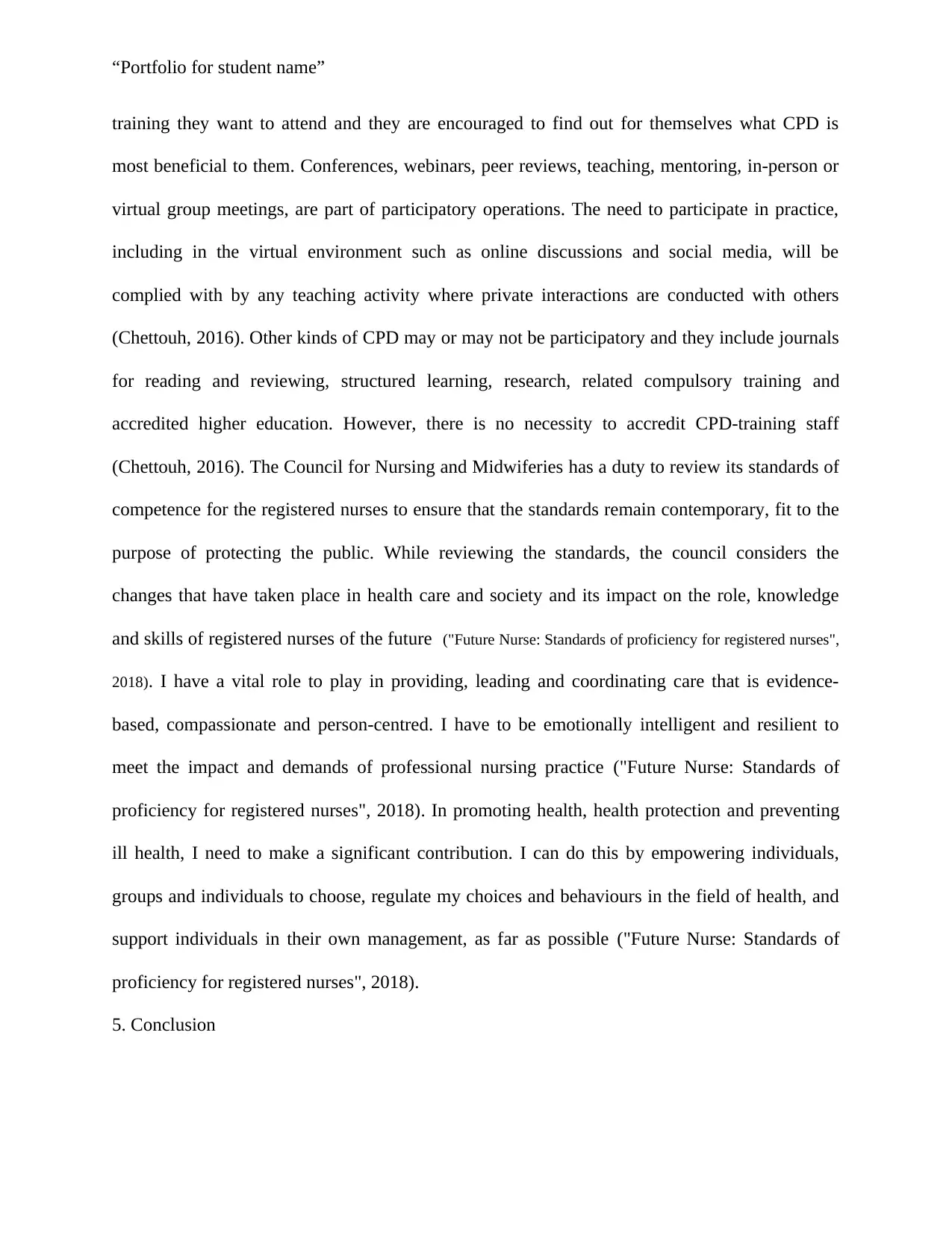
“Portfolio for student name”
training they want to attend and they are encouraged to find out for themselves what CPD is
most beneficial to them. Conferences, webinars, peer reviews, teaching, mentoring, in-person or
virtual group meetings, are part of participatory operations. The need to participate in practice,
including in the virtual environment such as online discussions and social media, will be
complied with by any teaching activity where private interactions are conducted with others
(Chettouh, 2016). Other kinds of CPD may or may not be participatory and they include journals
for reading and reviewing, structured learning, research, related compulsory training and
accredited higher education. However, there is no necessity to accredit CPD-training staff
(Chettouh, 2016). The Council for Nursing and Midwiferies has a duty to review its standards of
competence for the registered nurses to ensure that the standards remain contemporary, fit to the
purpose of protecting the public. While reviewing the standards, the council considers the
changes that have taken place in health care and society and its impact on the role, knowledge
and skills of registered nurses of the future ("Future Nurse: Standards of proficiency for registered nurses",
2018). I have a vital role to play in providing, leading and coordinating care that is evidence-
based, compassionate and person-centred. I have to be emotionally intelligent and resilient to
meet the impact and demands of professional nursing practice ("Future Nurse: Standards of
proficiency for registered nurses", 2018). In promoting health, health protection and preventing
ill health, I need to make a significant contribution. I can do this by empowering individuals,
groups and individuals to choose, regulate my choices and behaviours in the field of health, and
support individuals in their own management, as far as possible ("Future Nurse: Standards of
proficiency for registered nurses", 2018).
5. Conclusion
training they want to attend and they are encouraged to find out for themselves what CPD is
most beneficial to them. Conferences, webinars, peer reviews, teaching, mentoring, in-person or
virtual group meetings, are part of participatory operations. The need to participate in practice,
including in the virtual environment such as online discussions and social media, will be
complied with by any teaching activity where private interactions are conducted with others
(Chettouh, 2016). Other kinds of CPD may or may not be participatory and they include journals
for reading and reviewing, structured learning, research, related compulsory training and
accredited higher education. However, there is no necessity to accredit CPD-training staff
(Chettouh, 2016). The Council for Nursing and Midwiferies has a duty to review its standards of
competence for the registered nurses to ensure that the standards remain contemporary, fit to the
purpose of protecting the public. While reviewing the standards, the council considers the
changes that have taken place in health care and society and its impact on the role, knowledge
and skills of registered nurses of the future ("Future Nurse: Standards of proficiency for registered nurses",
2018). I have a vital role to play in providing, leading and coordinating care that is evidence-
based, compassionate and person-centred. I have to be emotionally intelligent and resilient to
meet the impact and demands of professional nursing practice ("Future Nurse: Standards of
proficiency for registered nurses", 2018). In promoting health, health protection and preventing
ill health, I need to make a significant contribution. I can do this by empowering individuals,
groups and individuals to choose, regulate my choices and behaviours in the field of health, and
support individuals in their own management, as far as possible ("Future Nurse: Standards of
proficiency for registered nurses", 2018).
5. Conclusion
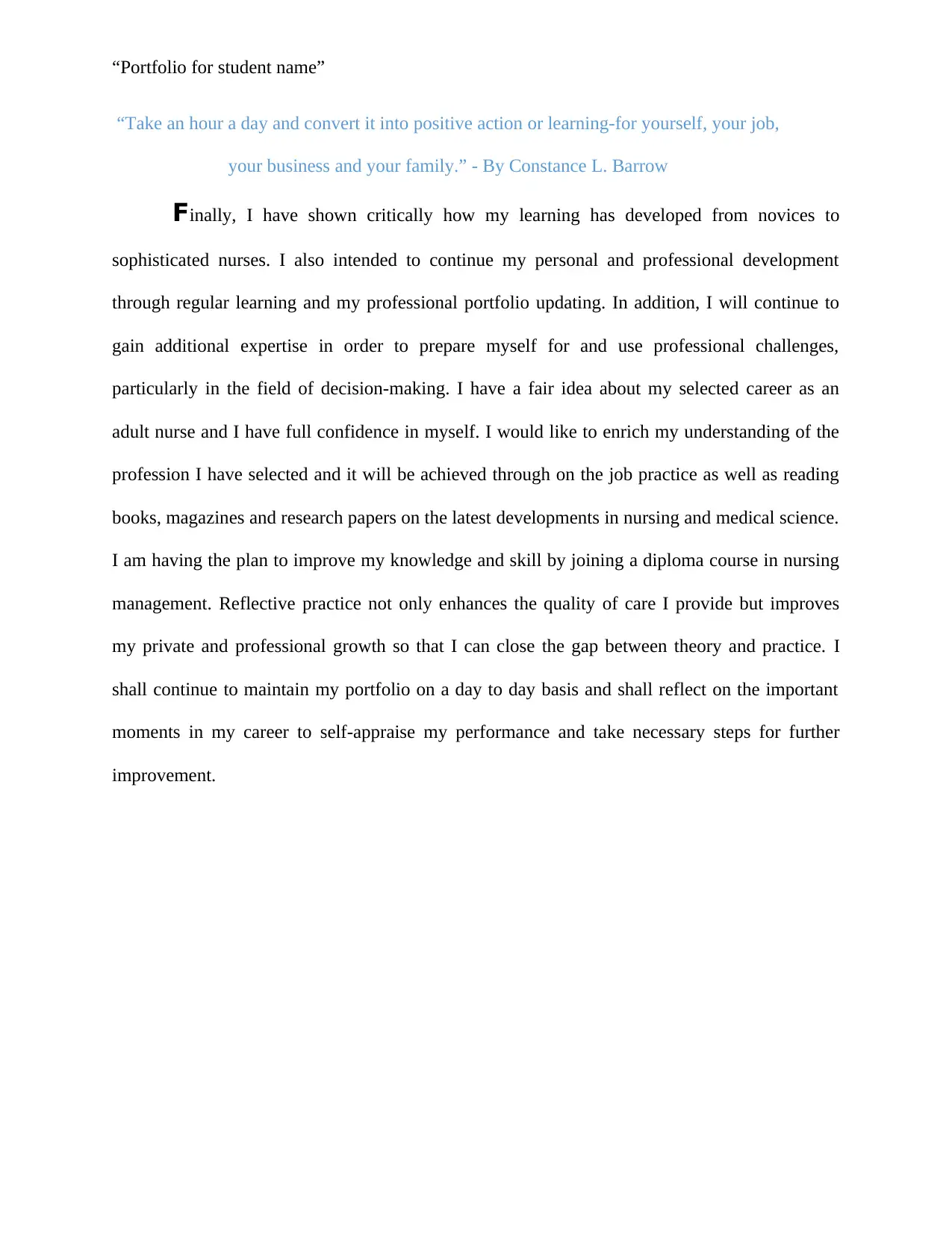
“Portfolio for student name”
“Take an hour a day and convert it into positive action or learning-for yourself, your job,
your business and your family.” - By Constance L. Barrow
Finally, I have shown critically how my learning has developed from novices to
sophisticated nurses. I also intended to continue my personal and professional development
through regular learning and my professional portfolio updating. In addition, I will continue to
gain additional expertise in order to prepare myself for and use professional challenges,
particularly in the field of decision-making. I have a fair idea about my selected career as an
adult nurse and I have full confidence in myself. I would like to enrich my understanding of the
profession I have selected and it will be achieved through on the job practice as well as reading
books, magazines and research papers on the latest developments in nursing and medical science.
I am having the plan to improve my knowledge and skill by joining a diploma course in nursing
management. Reflective practice not only enhances the quality of care I provide but improves
my private and professional growth so that I can close the gap between theory and practice. I
shall continue to maintain my portfolio on a day to day basis and shall reflect on the important
moments in my career to self-appraise my performance and take necessary steps for further
improvement.
“Take an hour a day and convert it into positive action or learning-for yourself, your job,
your business and your family.” - By Constance L. Barrow
Finally, I have shown critically how my learning has developed from novices to
sophisticated nurses. I also intended to continue my personal and professional development
through regular learning and my professional portfolio updating. In addition, I will continue to
gain additional expertise in order to prepare myself for and use professional challenges,
particularly in the field of decision-making. I have a fair idea about my selected career as an
adult nurse and I have full confidence in myself. I would like to enrich my understanding of the
profession I have selected and it will be achieved through on the job practice as well as reading
books, magazines and research papers on the latest developments in nursing and medical science.
I am having the plan to improve my knowledge and skill by joining a diploma course in nursing
management. Reflective practice not only enhances the quality of care I provide but improves
my private and professional growth so that I can close the gap between theory and practice. I
shall continue to maintain my portfolio on a day to day basis and shall reflect on the important
moments in my career to self-appraise my performance and take necessary steps for further
improvement.
⊘ This is a preview!⊘
Do you want full access?
Subscribe today to unlock all pages.

Trusted by 1+ million students worldwide
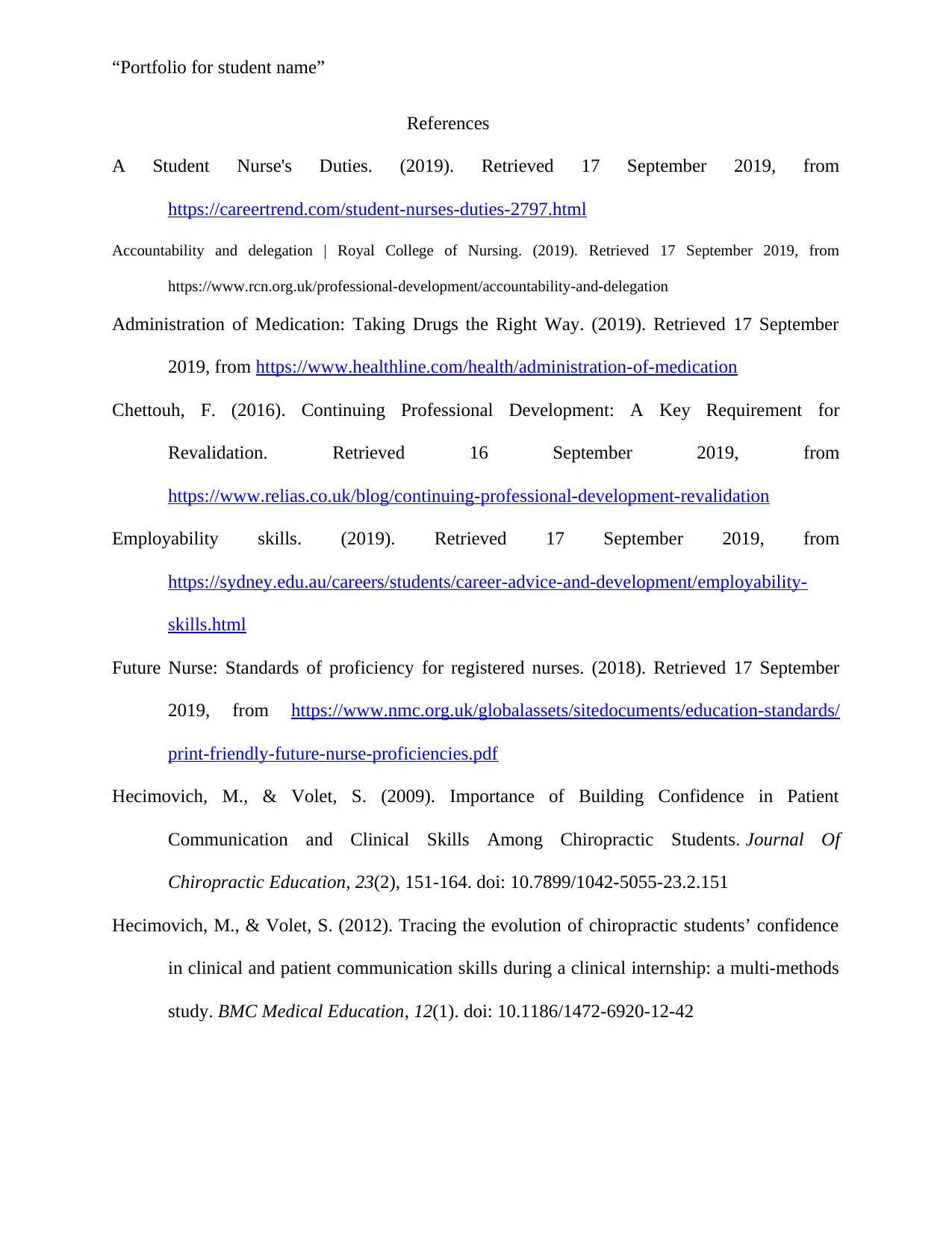
“Portfolio for student name”
References
A Student Nurse's Duties. (2019). Retrieved 17 September 2019, from
https://careertrend.com/student-nurses-duties-2797.html
Accountability and delegation | Royal College of Nursing. (2019). Retrieved 17 September 2019, from
https://www.rcn.org.uk/professional-development/accountability-and-delegation
Administration of Medication: Taking Drugs the Right Way. (2019). Retrieved 17 September
2019, from https://www.healthline.com/health/administration-of-medication
Chettouh, F. (2016). Continuing Professional Development: A Key Requirement for
Revalidation. Retrieved 16 September 2019, from
https://www.relias.co.uk/blog/continuing-professional-development-revalidation
Employability skills. (2019). Retrieved 17 September 2019, from
https://sydney.edu.au/careers/students/career-advice-and-development/employability-
skills.html
Future Nurse: Standards of proficiency for registered nurses. (2018). Retrieved 17 September
2019, from https://www.nmc.org.uk/globalassets/sitedocuments/education-standards/
print-friendly-future-nurse-proficiencies.pdf
Hecimovich, M., & Volet, S. (2009). Importance of Building Confidence in Patient
Communication and Clinical Skills Among Chiropractic Students. Journal Of
Chiropractic Education, 23(2), 151-164. doi: 10.7899/1042-5055-23.2.151
Hecimovich, M., & Volet, S. (2012). Tracing the evolution of chiropractic students’ confidence
in clinical and patient communication skills during a clinical internship: a multi-methods
study. BMC Medical Education, 12(1). doi: 10.1186/1472-6920-12-42
References
A Student Nurse's Duties. (2019). Retrieved 17 September 2019, from
https://careertrend.com/student-nurses-duties-2797.html
Accountability and delegation | Royal College of Nursing. (2019). Retrieved 17 September 2019, from
https://www.rcn.org.uk/professional-development/accountability-and-delegation
Administration of Medication: Taking Drugs the Right Way. (2019). Retrieved 17 September
2019, from https://www.healthline.com/health/administration-of-medication
Chettouh, F. (2016). Continuing Professional Development: A Key Requirement for
Revalidation. Retrieved 16 September 2019, from
https://www.relias.co.uk/blog/continuing-professional-development-revalidation
Employability skills. (2019). Retrieved 17 September 2019, from
https://sydney.edu.au/careers/students/career-advice-and-development/employability-
skills.html
Future Nurse: Standards of proficiency for registered nurses. (2018). Retrieved 17 September
2019, from https://www.nmc.org.uk/globalassets/sitedocuments/education-standards/
print-friendly-future-nurse-proficiencies.pdf
Hecimovich, M., & Volet, S. (2009). Importance of Building Confidence in Patient
Communication and Clinical Skills Among Chiropractic Students. Journal Of
Chiropractic Education, 23(2), 151-164. doi: 10.7899/1042-5055-23.2.151
Hecimovich, M., & Volet, S. (2012). Tracing the evolution of chiropractic students’ confidence
in clinical and patient communication skills during a clinical internship: a multi-methods
study. BMC Medical Education, 12(1). doi: 10.1186/1472-6920-12-42
Paraphrase This Document
Need a fresh take? Get an instant paraphrase of this document with our AI Paraphraser
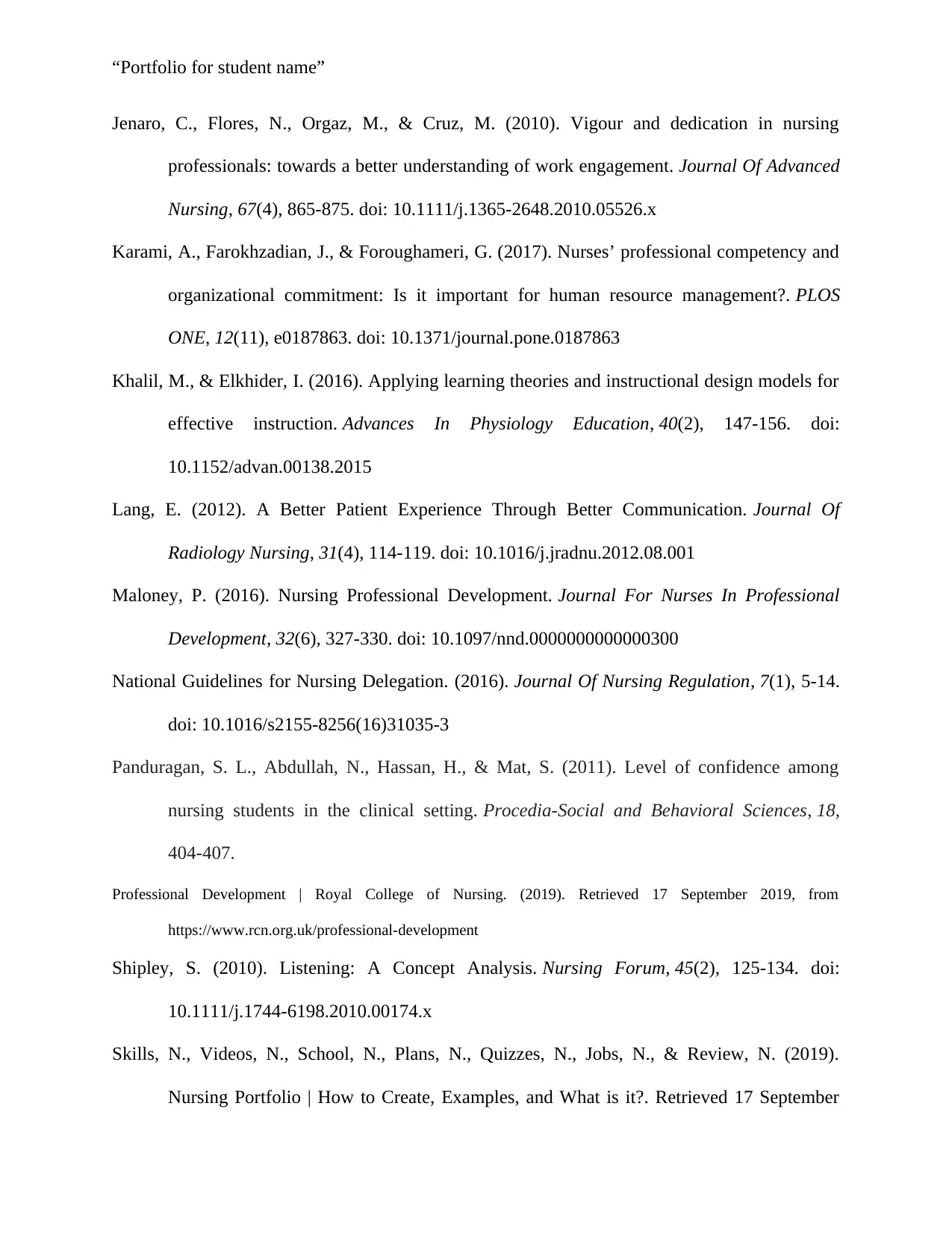
“Portfolio for student name”
Jenaro, C., Flores, N., Orgaz, M., & Cruz, M. (2010). Vigour and dedication in nursing
professionals: towards a better understanding of work engagement. Journal Of Advanced
Nursing, 67(4), 865-875. doi: 10.1111/j.1365-2648.2010.05526.x
Karami, A., Farokhzadian, J., & Foroughameri, G. (2017). Nurses’ professional competency and
organizational commitment: Is it important for human resource management?. PLOS
ONE, 12(11), e0187863. doi: 10.1371/journal.pone.0187863
Khalil, M., & Elkhider, I. (2016). Applying learning theories and instructional design models for
effective instruction. Advances In Physiology Education, 40(2), 147-156. doi:
10.1152/advan.00138.2015
Lang, E. (2012). A Better Patient Experience Through Better Communication. Journal Of
Radiology Nursing, 31(4), 114-119. doi: 10.1016/j.jradnu.2012.08.001
Maloney, P. (2016). Nursing Professional Development. Journal For Nurses In Professional
Development, 32(6), 327-330. doi: 10.1097/nnd.0000000000000300
National Guidelines for Nursing Delegation. (2016). Journal Of Nursing Regulation, 7(1), 5-14.
doi: 10.1016/s2155-8256(16)31035-3
Panduragan, S. L., Abdullah, N., Hassan, H., & Mat, S. (2011). Level of confidence among
nursing students in the clinical setting. Procedia-Social and Behavioral Sciences, 18,
404-407.
Professional Development | Royal College of Nursing. (2019). Retrieved 17 September 2019, from
https://www.rcn.org.uk/professional-development
Shipley, S. (2010). Listening: A Concept Analysis. Nursing Forum, 45(2), 125-134. doi:
10.1111/j.1744-6198.2010.00174.x
Skills, N., Videos, N., School, N., Plans, N., Quizzes, N., Jobs, N., & Review, N. (2019).
Nursing Portfolio | How to Create, Examples, and What is it?. Retrieved 17 September
Jenaro, C., Flores, N., Orgaz, M., & Cruz, M. (2010). Vigour and dedication in nursing
professionals: towards a better understanding of work engagement. Journal Of Advanced
Nursing, 67(4), 865-875. doi: 10.1111/j.1365-2648.2010.05526.x
Karami, A., Farokhzadian, J., & Foroughameri, G. (2017). Nurses’ professional competency and
organizational commitment: Is it important for human resource management?. PLOS
ONE, 12(11), e0187863. doi: 10.1371/journal.pone.0187863
Khalil, M., & Elkhider, I. (2016). Applying learning theories and instructional design models for
effective instruction. Advances In Physiology Education, 40(2), 147-156. doi:
10.1152/advan.00138.2015
Lang, E. (2012). A Better Patient Experience Through Better Communication. Journal Of
Radiology Nursing, 31(4), 114-119. doi: 10.1016/j.jradnu.2012.08.001
Maloney, P. (2016). Nursing Professional Development. Journal For Nurses In Professional
Development, 32(6), 327-330. doi: 10.1097/nnd.0000000000000300
National Guidelines for Nursing Delegation. (2016). Journal Of Nursing Regulation, 7(1), 5-14.
doi: 10.1016/s2155-8256(16)31035-3
Panduragan, S. L., Abdullah, N., Hassan, H., & Mat, S. (2011). Level of confidence among
nursing students in the clinical setting. Procedia-Social and Behavioral Sciences, 18,
404-407.
Professional Development | Royal College of Nursing. (2019). Retrieved 17 September 2019, from
https://www.rcn.org.uk/professional-development
Shipley, S. (2010). Listening: A Concept Analysis. Nursing Forum, 45(2), 125-134. doi:
10.1111/j.1744-6198.2010.00174.x
Skills, N., Videos, N., School, N., Plans, N., Quizzes, N., Jobs, N., & Review, N. (2019).
Nursing Portfolio | How to Create, Examples, and What is it?. Retrieved 17 September
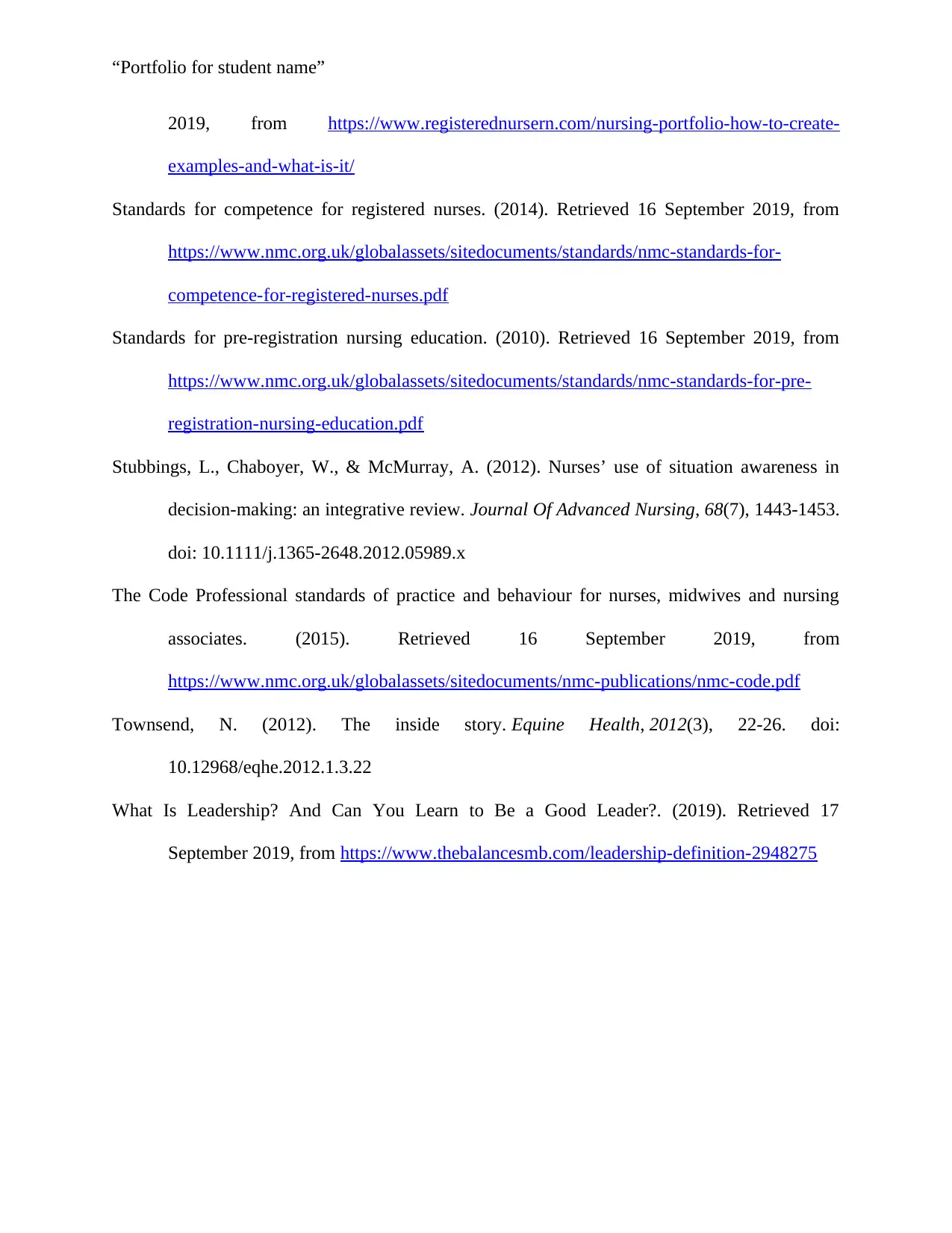
“Portfolio for student name”
2019, from https://www.registerednursern.com/nursing-portfolio-how-to-create-
examples-and-what-is-it/
Standards for competence for registered nurses. (2014). Retrieved 16 September 2019, from
https://www.nmc.org.uk/globalassets/sitedocuments/standards/nmc-standards-for-
competence-for-registered-nurses.pdf
Standards for pre-registration nursing education. (2010). Retrieved 16 September 2019, from
https://www.nmc.org.uk/globalassets/sitedocuments/standards/nmc-standards-for-pre-
registration-nursing-education.pdf
Stubbings, L., Chaboyer, W., & McMurray, A. (2012). Nurses’ use of situation awareness in
decision-making: an integrative review. Journal Of Advanced Nursing, 68(7), 1443-1453.
doi: 10.1111/j.1365-2648.2012.05989.x
The Code Professional standards of practice and behaviour for nurses, midwives and nursing
associates. (2015). Retrieved 16 September 2019, from
https://www.nmc.org.uk/globalassets/sitedocuments/nmc-publications/nmc-code.pdf
Townsend, N. (2012). The inside story. Equine Health, 2012(3), 22-26. doi:
10.12968/eqhe.2012.1.3.22
What Is Leadership? And Can You Learn to Be a Good Leader?. (2019). Retrieved 17
September 2019, from https://www.thebalancesmb.com/leadership-definition-2948275
2019, from https://www.registerednursern.com/nursing-portfolio-how-to-create-
examples-and-what-is-it/
Standards for competence for registered nurses. (2014). Retrieved 16 September 2019, from
https://www.nmc.org.uk/globalassets/sitedocuments/standards/nmc-standards-for-
competence-for-registered-nurses.pdf
Standards for pre-registration nursing education. (2010). Retrieved 16 September 2019, from
https://www.nmc.org.uk/globalassets/sitedocuments/standards/nmc-standards-for-pre-
registration-nursing-education.pdf
Stubbings, L., Chaboyer, W., & McMurray, A. (2012). Nurses’ use of situation awareness in
decision-making: an integrative review. Journal Of Advanced Nursing, 68(7), 1443-1453.
doi: 10.1111/j.1365-2648.2012.05989.x
The Code Professional standards of practice and behaviour for nurses, midwives and nursing
associates. (2015). Retrieved 16 September 2019, from
https://www.nmc.org.uk/globalassets/sitedocuments/nmc-publications/nmc-code.pdf
Townsend, N. (2012). The inside story. Equine Health, 2012(3), 22-26. doi:
10.12968/eqhe.2012.1.3.22
What Is Leadership? And Can You Learn to Be a Good Leader?. (2019). Retrieved 17
September 2019, from https://www.thebalancesmb.com/leadership-definition-2948275
⊘ This is a preview!⊘
Do you want full access?
Subscribe today to unlock all pages.

Trusted by 1+ million students worldwide
1 out of 12
Related Documents
Your All-in-One AI-Powered Toolkit for Academic Success.
+13062052269
info@desklib.com
Available 24*7 on WhatsApp / Email
![[object Object]](/_next/static/media/star-bottom.7253800d.svg)
Unlock your academic potential
Copyright © 2020–2026 A2Z Services. All Rights Reserved. Developed and managed by ZUCOL.





